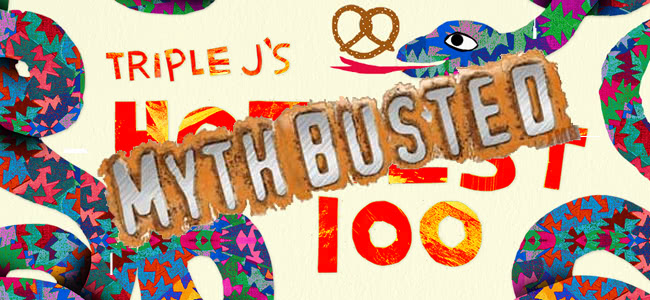Can you believe August is already almost over? This year has certainly flown past and the New Year is just around the corner, which means we’re coming up on the holiday season, and more importantly Hottest 100 season.
The world’s biggest fan-voted music poll has been making headlines in recent weeks. There’s a campaign underway to see the date of the broadcast changed and a lecturer recently revealed how one can predict the poll’s outcome.
During a talk at programming conference PyCon, tech consultant Justin Warren explained how high-tech Hottest 100 predictions like the Warmest 100 and its various imitators, such as the Tepid 100, do what they do.
But according to another stat-head, Thomas McMahon, the number of plays a track gets on triple j is not necessarily an accurate predictor of how highly that song will ultimately rank in the countdown.
“So had a quick exploration of the relationship between play count and Hottest 100 rank. Short answer – nothing doing,” McMahon recently tweeted, before sharing a graph showing a negative correlation between play count and Hottest 100 rank.
The graph only represents the 2015 Hottest 100, but according to McMahon’s calculations, you’re actually better off receiving an average amount of attention from Australia’s youth broadcaster than being absolutely flogged.
Long answer – at least for that year hottest 100 rank and plays are negatively correlated. pic.twitter.com/OhFw50xZ4R
— Thomas McMahon (@thmcmahon) August 30, 2016
Sure, there’s outliers, and it’s only a correlation, but McMahon’s graph suggests that getting a lot of plays on triple j does not necessarily mean you’ll secure a high position in the Hottest 100. At least it didn’t in 2015.
One of the reasons for this could possibly be due to the fact that Hottest 100-topping songs often receive significant airplay on other stations, specifically commercial stations with large audiences, but may not be as popular on triple j airwaves.
triple j also prides itself on supporting smaller, independent artists. The result is that a smaller artist may garner a lot of triple j airplay, but still won’t have the profile or recognition of a bigger artist with fewer plays.
It’s probably one of the most persistent myths surrounding the Hottest 100 — that securing a lot of airtime on triple j will guarantee success in the Hottest 100 — but that may not necessarily be true.

































